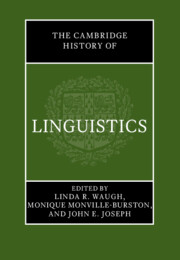Book contents
- The Cambridge History of Linguistics
- The Cambridge History of Linguistics
- Copyright page
- Dedication
- Contents
- Figures
- Tables
- Contributors
- Preface
- Acknowledgments
- Abbreviations, Acronyms, Special Symbols, and Other Conventions
- Introduction
- Part I Ancient, Classical, and Medieval Periods
- Introduction To Part I The Emergence of Linguistic Thinking within Premodern Cultural Practices
- 1 Ancient Near Eastern Linguistic Traditions: Mesopotamia, Egypt
- 2 East Asian Early Linguistic Traditions: China; Korea and Japan
- 3 History of Linguistic Analysis in the Sanskrit Tradition in Premodern India, with a Brief Discussion of Vernacular Grammars
- 4 Greek Linguistic Thought and its Roman Reception
- 5 Early to Late Medieval Europe
- 6 Near Eastern Linguistic Traditions
- 6A The Syriac Linguistic Tradition
- 6B The Hebrew Linguistic Tradition
- 6C The Arabic Linguistic Tradition
- Part II Renaissance to Late Nineteenth Century
- Part III Late Nineteenth-through Twentieth-Century Linguistics
- Part IIIA Late Nineteenth Century through the 1950s: Synchrony, Autonomy, and Structuralism
- Part IIIB 1960–2000: Formalism, Cognitivism, Language Use and Function, Interdisciplinarity
- References
- Index
6C - The Arabic Linguistic Tradition
from Part I - Ancient, Classical, and Medieval Periods
Published online by Cambridge University Press: 20 July 2023
- The Cambridge History of Linguistics
- The Cambridge History of Linguistics
- Copyright page
- Dedication
- Contents
- Figures
- Tables
- Contributors
- Preface
- Acknowledgments
- Abbreviations, Acronyms, Special Symbols, and Other Conventions
- Introduction
- Part I Ancient, Classical, and Medieval Periods
- Introduction To Part I The Emergence of Linguistic Thinking within Premodern Cultural Practices
- 1 Ancient Near Eastern Linguistic Traditions: Mesopotamia, Egypt
- 2 East Asian Early Linguistic Traditions: China; Korea and Japan
- 3 History of Linguistic Analysis in the Sanskrit Tradition in Premodern India, with a Brief Discussion of Vernacular Grammars
- 4 Greek Linguistic Thought and its Roman Reception
- 5 Early to Late Medieval Europe
- 6 Near Eastern Linguistic Traditions
- 6A The Syriac Linguistic Tradition
- 6B The Hebrew Linguistic Tradition
- 6C The Arabic Linguistic Tradition
- Part II Renaissance to Late Nineteenth Century
- Part III Late Nineteenth-through Twentieth-Century Linguistics
- Part IIIA Late Nineteenth Century through the 1950s: Synchrony, Autonomy, and Structuralism
- Part IIIB 1960–2000: Formalism, Cognitivism, Language Use and Function, Interdisciplinarity
- References
- Index
Summary
When, after the Muslin conquest, new vernaculars emerged which differed from the language of the Qurʾān, exegetic commentaries became necessary. Grammarians aimed at explaining features in this diglossia within a formal framework. Sībawayhi (eighth century) wrote a fully developed grammar of Arabic which became a highly influential model and included, especially, words analysed in terms of roots, a dependency type of syntax, verb-agent vs. topic-comment sentences.With the spread of Islam, Arabic acquired large numbers of speakers, and grammars of indigenous languages were written — with adaptations — using the Arabic model.
Keywords
- Type
- Chapter
- Information
- The Cambridge History of Linguistics , pp. 195 - 212Publisher: Cambridge University PressPrint publication year: 2023

